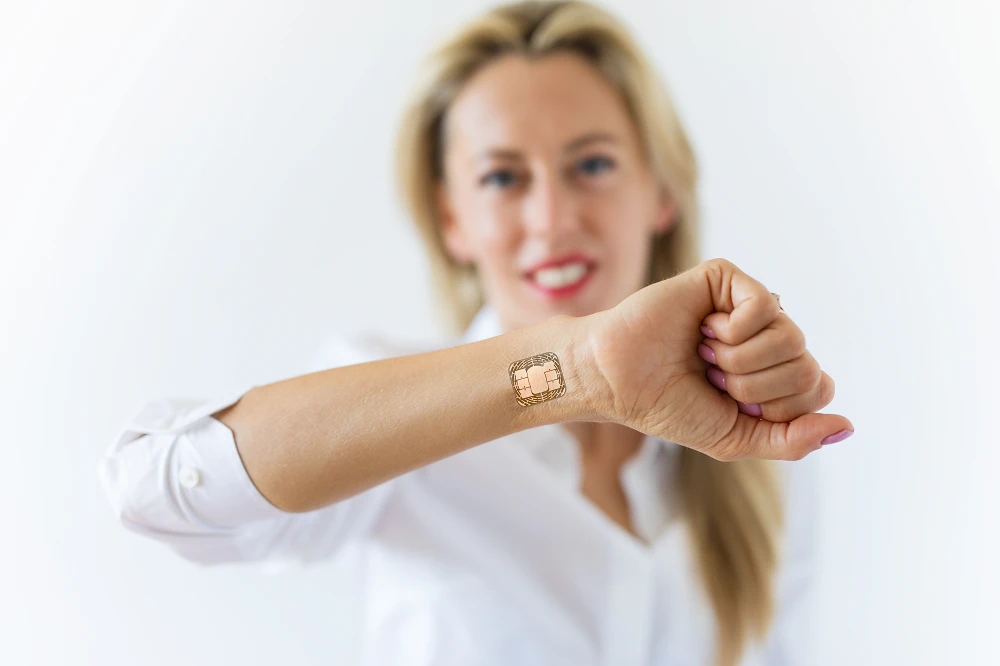Bioelectronics

Current developments in electronics – with sensors and biological materials – are making it possible to connect electronic devices directly to the human body more closely than ever before. In medicine, these devices make it possible to stimulate nerves or receive neural signals, and the first applications for video games or to promote our performance (human enhancement) are now available. In addition, implanted chips – used solely to store information – can identify individuals, for instance, for access control.
Focus of the study
This interdisciplinary TA study aims to assess opportunities and risks of bioelectronics. Interactive systems as well as those that serve only to identify users are considered. The study describes already existing possibilities as well as areas that are currently being researched, and it examines potential future applications in humans and animals. Controversial aspects that could impact a large number of people in Switzerland are of particular interest. Established methods used for therapeutic purposes may be included to illustrate technical feasibility, but these are not the actual focus of the study. Expectations for bioelectronics are high due to rapid technological developments in the area of biological materials and sensors, and because artificial intelligence systems are finding wider application in this field. This study aims to provide an overview of both the real benefits brought by these technologies and the risks associated with their use. Of particular interest are services and goods that are marketed directly to consumers. ‘Bioelectronics’ as a field also includes devices that contain electronic and biological components (e.g. biosensors); such devices only form part of the study if they interact with a living organism.
Societal questions concern possible applications of human enhancement. Further, the study explores the question of how data generated by neuro-technological systems are used – especially when private companies combine these data with other data and use them for commercial purposes. With regard to legal matters, the study examines where action is required in Switzerland in general – for example, concerning liability or with regard to the protection of sensitive data. Moreover, the study outlines the ethical questions that have bearing: one problem is the loss of autonomy and the lack of clarity regarding accountability (hybrid agency) when the human body and electronic systems interact directly. Lastly, the TA study aims to present an overall assessment of the situation that serves as the basis for drawing final conclusions and ideally for formulating recommendations on how to deal with bioelectronics. These recommendations are directed towards decision makers, in particular politicians.
Links and downloads
Organisation
Projektdauer
February 2021 until summer 2022
Projektgruppe
- Dr. Anne Eckhardt, risicare GmbH, Zollikerberg (Projektleiterin)
- Prof. Dr. Andreas Abegg, Samra Ibric und PD Dr. Goran Seferovic, Zürcher Hochschule für Angewandte Wissenschaften ZHAW
- Prof. Dr. Stéphanie Lacour und Dr. Niels Lion, Ecole polytechnique fédérale de Lausanne EPFL
- Dr. Julia Wolf, Lehrbeauftragte und Dozentin für Ethik im Gesundheitswesen, Riehen
Begleitgruppe
- Prof. Dr. Christina Aus der Au, Medical Humanities, Université de Fribourg
- Peter Biedermann, SwissMedTech, Bern
- PD Dr. Markus Christen, Digital Society Initiative, Universität Zürich
- Prof. Dr. Antoine Geissbuhler, Service de cybersanté et télémédecine, Hôpitaux Universitaires de Genève, Delegierter der SAMW
- Prof. Dr. Malte-C. Gruber, Rechtswissenschaftliche Fakultät, Universität Luzern
- Thomas Müller, Redaktor Radio SRF, TA-SWISS-Leitungsausschuss
- Dr. Tobias Ruff, Laboratory of Biosensors and Bioelectronics, ETH Zürich
- Prof. Dr. Giatgen Spinas, Universität Zürich, TA-SWISS-Leitungsausschuss
Contact
Adrian Rüegsegger, TA-SWISS
adrian.rueegsegger@ta-swiss.ch